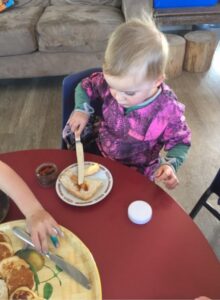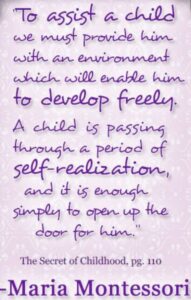I watched a video the other day where adults would give a young child an egg and see what they would do with it and if they would break it. The adults were suprised the child would care for the egg, being gentle and kind.
This made me think about how it is so common for adults to underestimate our young children. Depriving them of lifes simple beauties, joys and opportunities to be seen as capable, gentle and respectful.
When I worked in an infants and toddlers centre a few years ago, the children ate from plastic plates and used plastic cups.
The plastic plates had scratches all over them, the cups had bite marks and bends in them. They were out of shape and looked tacky and cheap.
As we reviewed our eating practices, we had the lens that food should always be a pleasure. Almost immediately, we made the change from plastic cups and plates, to using open glasses and crockery plates. Real teaspoons instead of plastic. Immediately it felt like the children were more valued and trusted, as capable beings. They were viewed as able. We all know it, children always want what adults have. They want the food off mums plate. This highlights the value of keeping it same same. When children are allowed to use real things, they are empowered and it shows them they are trusted. It gives them a sense of confidence and belief that ‘I can’.

Baby food jars proved to be great drinking glasses for our littlest friends – the size was great, only a small amount of water and easily held as their little hands easily grasped around. This was also a sustainable choice.
Glass, crockery, porcelain and stainless steel are sustainable. They last longer and you will have to replace them far less than their plastic counterparts.
Not to mention: Plastic has the potential to leach ‘toxins’.
We had surprisingly few breaks. More in the beginning, but still only a few. The real materials allowed the children to learn natural consequences … drop a glass and it will break. Less table swiping happened. The children learnt to adjust their movements to protect the fragility of their environment.

The glasses seemed to bring more joy and concentration when drinking. There was no more flicking of water from their sippy cups. Children learnt to use two hands to control the glass and to place it on the table instead of drop it. This was a meaningful and real way to learn about kind and gentle hands.
They even helped eachother to remember and they seemed to drink MORE water.
The children soon learnt the plates and cups were heavier than the plastic ones and they weren’t nearly as ‘fun’ to throw. If the children did drop them off the table, it followed with a process to tidy up. Actually most of the breakages that did occur were simply learning accidents – plate sitting too close to the edge, or being knocked off with the back of an arm – encouraging more mindful eating.

Our eating table became a place of beauty and respect. Setting the table became a ritual. We picked greenery and flowers and placed them in a vase, we used placemats filled small water jug and we all sat around together. This created a space of peace, community and sharing. Our meal times lasted longer. Yes there were spills but the process of cleaning them up became learning events. We talked about it, we helped each other and we learnt.
These very young children proved very quickly that they were totally capable. Visiting adults to the centre would notice and comment on the calm meal time and how nice it was to see children using glasses and real plates.
Children were not put in high chairs, they were sitting at a low table with chairs that had sides. If they were not yet able to sit, the baby was held by a teacher who sat at the table with the other children.
When we do everything for our children and act as though they can’t or dont know, then they wont. Ultimately, we can open up a world of “I can, I will, I am”, and they will show us just how capable they are. Let them show us they can. This makes for easier parenting and teaching, as the children are now doing it for themselves. Watch them flourish. They can and they will if only we let them!
Oh and be sure to eat together at home. Even if you are not ready for your dinner, make a small plate of the same. Role model, for this is a teaching moment.

